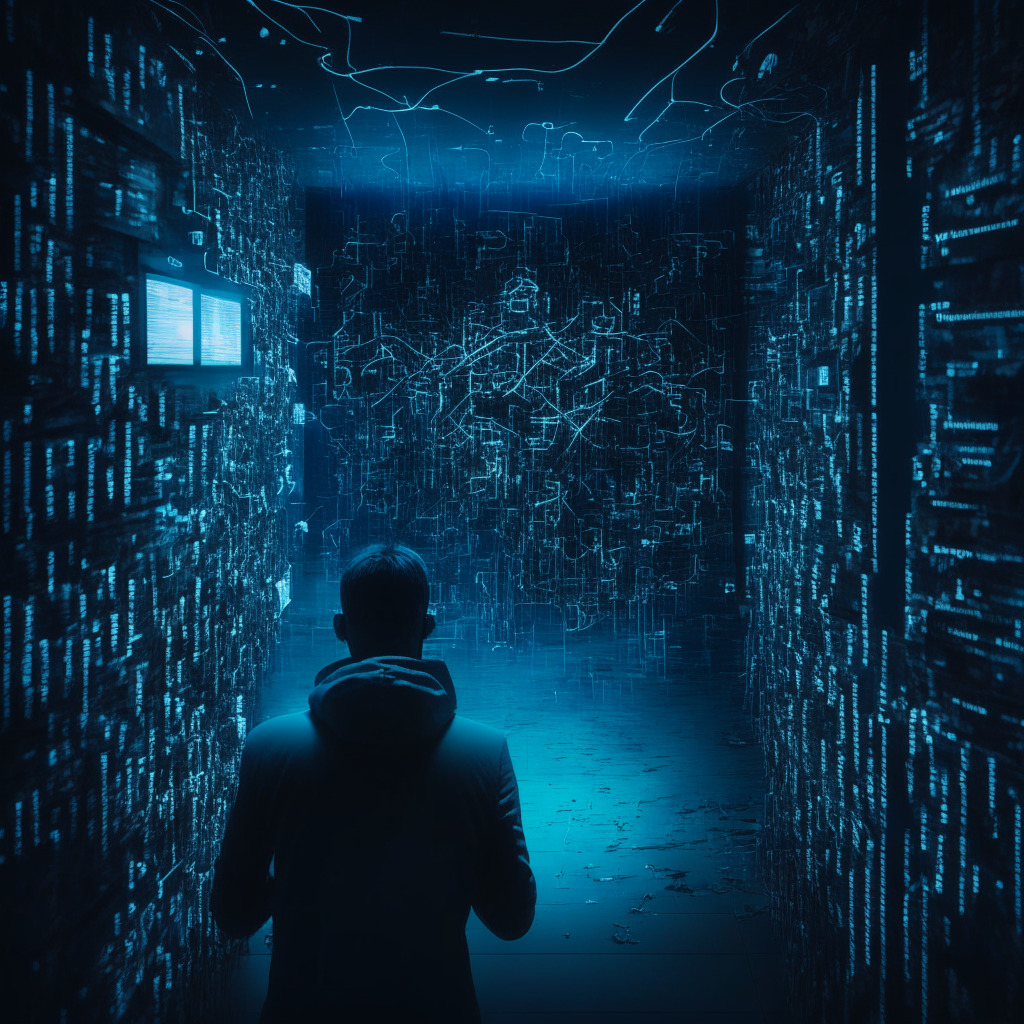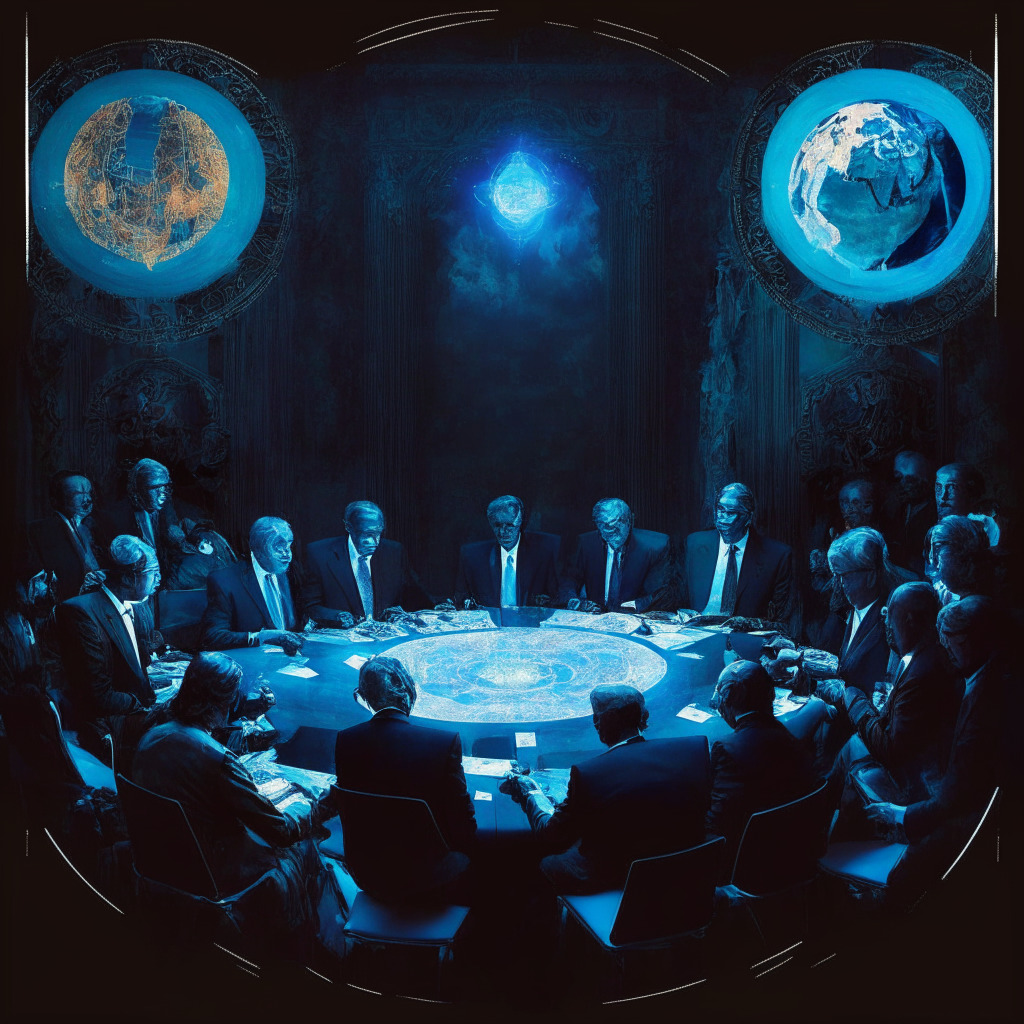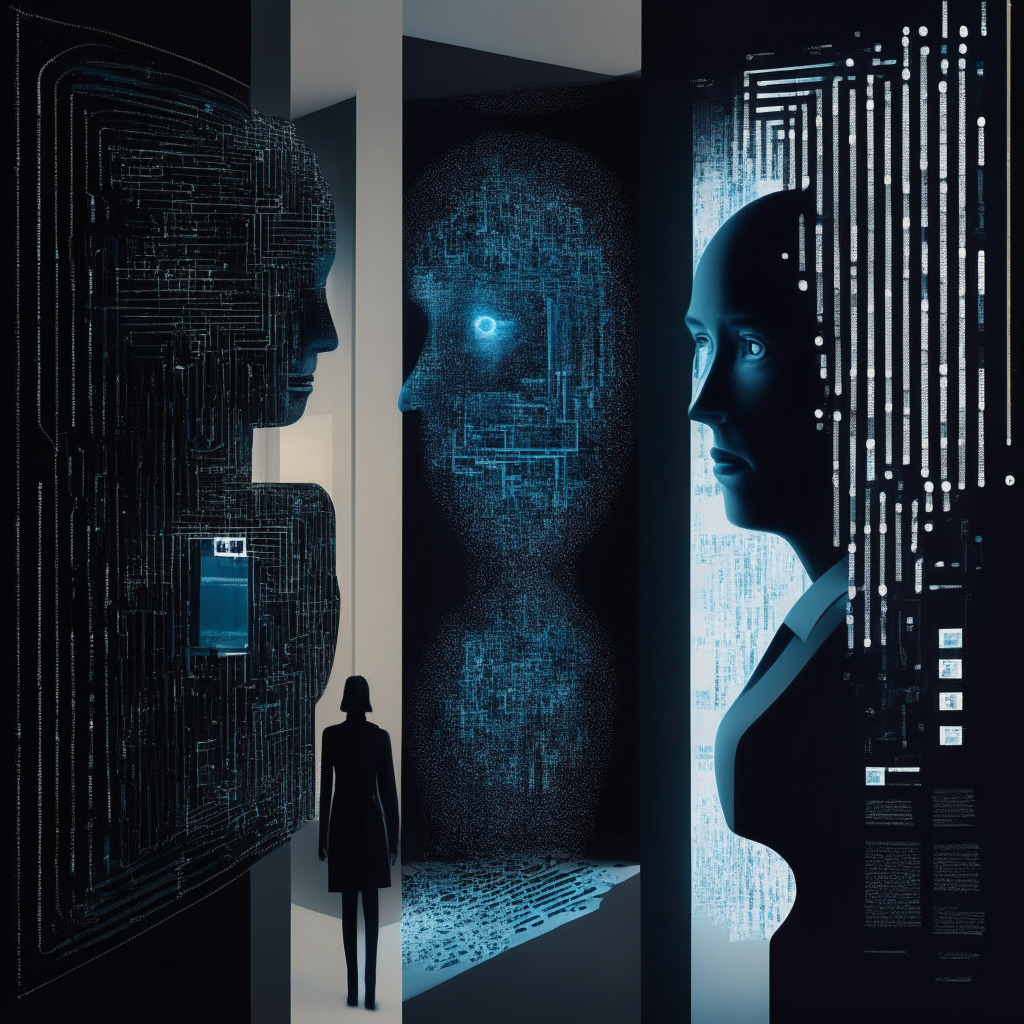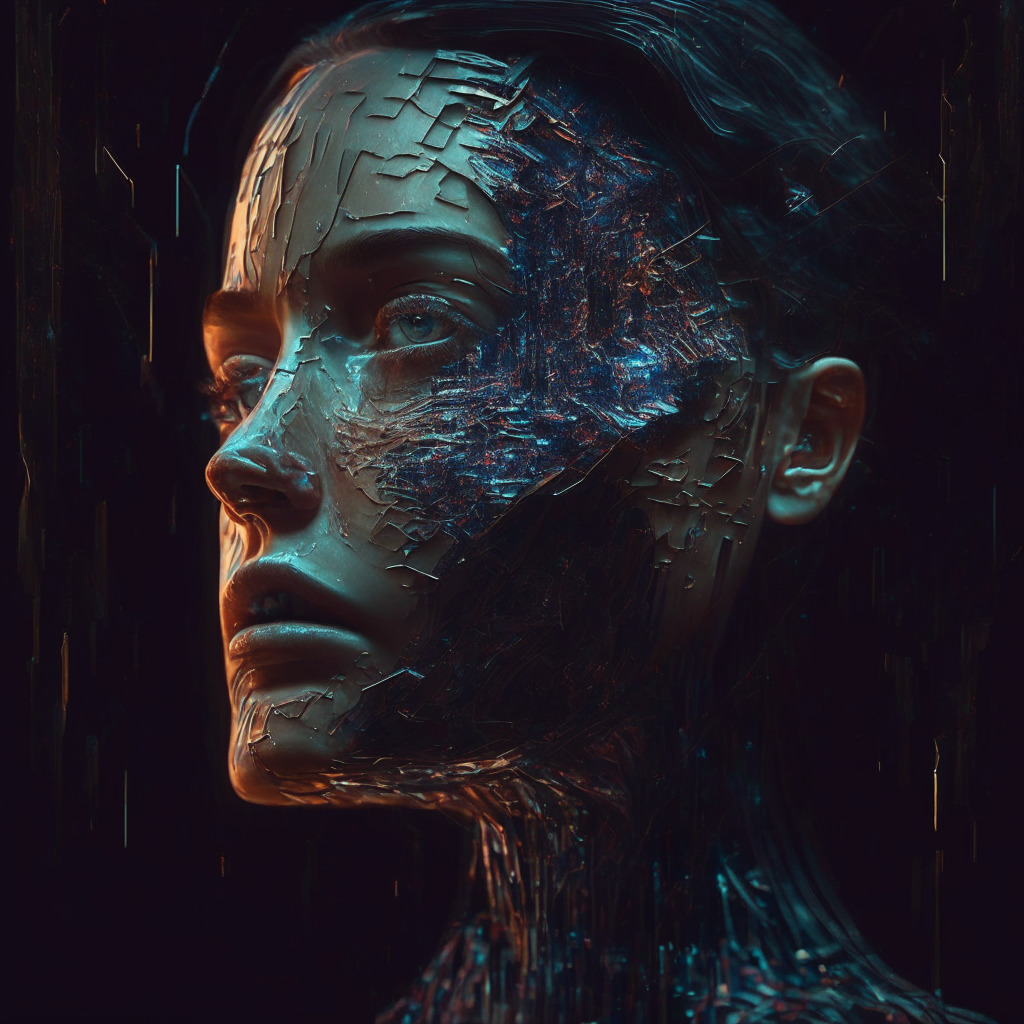Despite decreased interest in the metaverse, Neal Stephenson’s Blockchain project, Lamina1, continues its vision, organizing events to encourage metaverse-driven experiences. CEO Rebecca Barkin expresses optimism, noting the continued investment in digital experiences, gaming, and new technological explorations.
Search Results for: deepfake
Navigating the Ethical Minefield of AI: Polite Bots, Deepfakes, and Job Security
“The proliferation of AI comes with both promises and perils. Increased AI interaction raises questions about our behavior towards technology and its impact on our human interactions. As AI’s capabilities expand, from solving CAPTCHAs faster than humans to possible misuse with deepfake technology, skepticism and scrutiny are crucial for a safe journey into an AI-powered future.”
AI Deepfakes: A New Threat to Cryptocurrency Security Verification Systems
Binance CEO, Changpeng Zhao, has expressed concern over the potential threats AI-generated deepfake videos pose to cryptocurrency security. The advanced AI technology evident in the avatar and voice clone unveiled by HeyGen’s CEO could exploit loopholes in user verification processes. CoinGecko’s FAKEAI demonstrates the commercial potential of this technology, however, escalating AI capabilities present substantial security challenges within the crypto realm.
Deepfakes and Cryptocurrency: The Dual-edge Sword of AI in Secure Identification Verification
“The advent of AI brings risks to personal security, especially in cryptocurrency exchanges where deepfake personas can disrupt the authentication process. The Know-Your-Customer (KYC) measures, employed by exchanges like Binance, are increasingly vulnerable due to AI’s advancement.”
AI-Driven Scams in Crypto: Social Media Deception and Deepfake Dangers on the Rise
As AI advances, concerns grow about scammers exploiting this technology for fraud and deception, such as using AI-powered tools on social media platforms and AI-driven chatbots for promoting fake tokens and ICOs. This challenges the concept of social proof-of-work and puts vulnerable individuals within the crypto sphere at risk.
Combating Deepfakes: AI, Cryptography, and Harnessing the Wisdom of Online Communities
As AI image generators advance rapidly, detecting deepfakes becomes increasingly difficult, prompting concerns from law enforcement and global leaders. Solutions may involve AI detection, cryptography for authentication, and leveraging online communities for content validation, while balancing openness and responsibility in AI model usage.
Voicebox AI: Revolutionizing Speech Synthesis or Fueling Deepfake Dangers?
Meta’s new generative AI tool, Voicebox, creates realistic spoken dialogues but raises concerns about “deepfake” misuse. A cautious approach to sharing the technology is taken, emphasizing responsible innovation and addressing generative AI’s potential dangers, while minimizing negative consequences.
Deepfakes, Information Integrity, and the Urgent Call for AI Regulation: UN’s Stance
The UN emphasizes the “serious and urgent” threat posed by AI deepfakes to information integrity, particularly on social media, and calls for AI stakeholders to address the spread of false information, encouraging responsible use of AI technology.
Deepfakes, AI and Information Integrity: UN Report Raises Alarm on Misuse and its Impact
The UN report raises concerns about AI-generated deepfakes spreading hate and misinformation on social media, highlighting the importance of responsible AI use. It emphasizes the need to ensure information integrity, urging stakeholders to implement secure, ethical, and human rights-compliant measures for AI applications.
Navigating AI’s Promising Future Amidst Deepfakes, Job Loss, and Singularity Risks
AI’s rapid advancement brings potential risks such as deepfakes, privacy invasion, job loss concerns, technological fallacy, financial market volatility, and the Singularity concept with ethical questions. Society must address these challenges to ensure a safe, responsible future.
Rising Extortion Threats: Deepfakes Targeting Minors and Crypto Investors
The FBI warns that criminals use deepfakes for extortion, targeting victims by altering their photos or videos into explicit content. The increasing difficulty in identifying fraudulent content due to advanced AI technology highlights the importance of exercising caution and protecting personal information online.
YouTuber’s Channel Hacked to Promote XRP Scams: A Crypto Crime Drama with a Dash of Deepfakes
Popular YouTuber DidYouKnowGaming recently faced a hacking incident when an anonymous bad actor took control […]
Tencent’s AI Deepfake Generator: A Boon for Hosting Infomercials or a Bane for Crypto Scams?
Tencent Cloud, the cloud service provider arm of the Chinese tech giant Tencent, has recently […]
California’s AI Cloning Bill: Safeguarding Rights or Stifling Creative Progress?
Assembly Member Ash Kalra has proposed legislation aimed at safeguarding actors, artists and entertainers against the exploitation of AI clones. The bill seeks informed consent in employment contracts for digital replicates of individuals, highlighting a real threat within the entertainment industry.
Google’s AI Policy Update: A Step Towards Transparency or an Ethical Minefield?
Google’s recent policy update mandates disclosure of AI-generated content in political ads, aiming to increase transparency and ethics in AI. The policy will apply to image, audio, and video content from mid-November 2023 onwards. However, this doesn’t solve all AI ethics issues, especially given the rise of Deepfakes.
UK Proposes Global Alliance to Combat Misuse of AI: The Power Struggle Unfolds
The UK’s Science, Innovation and Technology Committee advocates for a global alliance to tackle potential misuse of AI, involving democratically similar nations. A proposed summit could position the UK as a central regulation hub, outlining guidelines for AI security, innovation and cultural impact. Potential AI threats include deepfakes and misuse in weaponry development.
Ransom Attacks: A Rising Threat Amidst Reducing Crypto Scams – An In-Depth Analysis
A substantial 77% decline in crypto scams is offset by a worrying rise in ransom attacks, seeing a 62.4% increase in perpetrator revenue. Large organizations are increasingly targeted for maximum extraction. Despite falling scam revenues reflecting heightened awareness, the future of blockchain security deals with challenges from sophisticated ransom attacks.
Generative AI: Revolutionizing Creativity or Fueling Ethical Dilemmas?
Generative AI, enabling machines to create original content, has impacted industries like art, music, and storytelling but raises ethical concerns, including deepfake content and perpetuating biases. Addressing these issues requires responsible AI development to ensure beneficial and ethical adoption.
Generative AI Boom: Balancing Privacy Risks and Technological Progress in a Data-Driven World
The meteoric ascent of generative artificial intelligence has raised privacy and security concerns amid user-focused products like OpenAI’s ChatGPT. Governments and tech figures are sounding the alarm as AI threats to data privacy go beyond one model or developer.
Regulating AI: Balancing Innovation with Generative Dangers and Global Cooperation
UN Secretary-General António Guterres joins the call for AI regulation, comparing its potential threat to humanity to nuclear war. European Parliament passes world’s first-ever AI legislation, while OpenAI CEO Sam Altman supports regulating AI through establishing a government office and standards for development.
Social Media Platforms Enabling Crypto Scams: How to Protect Consumers and Regulate Influencers
The European Consumer Organization (BEUC) report reveals that social media platforms like Instagram, TikTok, Twitter, and YouTube enable digital asset scams. The watchdog highlighted the risks of cryptocurrencies on consumers and criticized platforms’ lenient approach to crypto advertising. The BEUC has called for stricter enforcement of advertising policies and prohibiting influencer promotions to protect consumers from unfair practices within the digital asset space.
AI Regulation in Australia: Debating Bans on High-Risk Technologies and Criteria for Assessment
The Australian government is assessing potential risks associated with artificial intelligence (AI) by launching an eight-week consultation on high-risk AI tools. The consultation aims to gather feedback for promoting safe and responsible AI use, discussing ethical frameworks and possible regulations. This initiative reflects global efforts to understand and mitigate the risks in AI development.
US Debt Ceiling Agreement Fuels Bitcoin’s Rally: Will the Bullish Trend Continue or Correct?
Bitcoin’s value sees an uptick amid US debt ceiling discussions, as a preliminary agreement is reached between President Joe Biden and Republican leader Kevin McCarthy. The debt ceiling agreement could impact the Federal Reserve’s money-printing activities, potentially benefiting Bitcoin due to its inverse trading relationship with the USD. However, a significant barrier at the $28,300 level may affect Bitcoin’s upward trajectory.
AI-Generated Image Chaos: Impact on Stocks, Crypto, and the Need for Regulation
An AI-generated image depicting a false Pentagon explosion caused chaos on social media and a brief sell-off in the U.S. stock market. The incident raises concerns about unchecked AI development and highlights the importance of rigorous source verification.
AI’s Double-Edged Sword: Influencing Elections and Safeguarding Democracy
In this article, the potential threat of AI-generated text, deep fakes, and biased AI algorithms on democracy is discussed, as well as AI’s possible benefits in combating disinformation. With a multifaceted approach, involving government regulation, international cooperation, and public education, it’s possible to mitigate these risks.
MidJourney 5.1: Revolutionizing AI Art or Deepening Ethical Concerns?
MidJourney’s version 5.1 significantly improves AI-generated art, but its ease of creating deepfakes raises ethical concerns. Striking a balance between creative possibilities and potential risks is crucial as AI generators continue to evolve and improve.
Musk’s X.AI GPT: AI-Blockchain Revolution or Risk to Decentralization?
X.AI, directed by Elon Musk, introduces an AI model leveraging machine learning and natural language processing for the emerging blockchain market. However, concerns such as challenging decentralization, AI-generated content manipulation, and ethical dilemmas arise with this technology’s integration.
Hijacked YouTuber’s Channel: A Ripple(XRP) Scam Wonderland or a Crypto Investor’s Concern?
The recent hacking of prominent YouTuber DidYouKnowGaming’s channel to promote XRP (XRP) cryptocurrency scams has […]



























